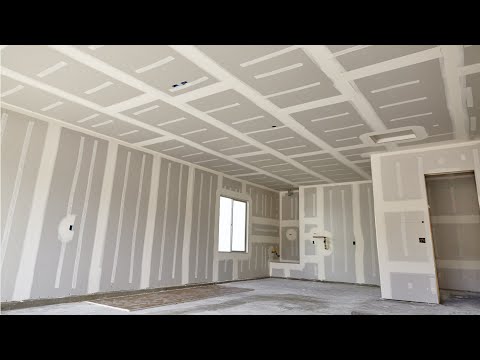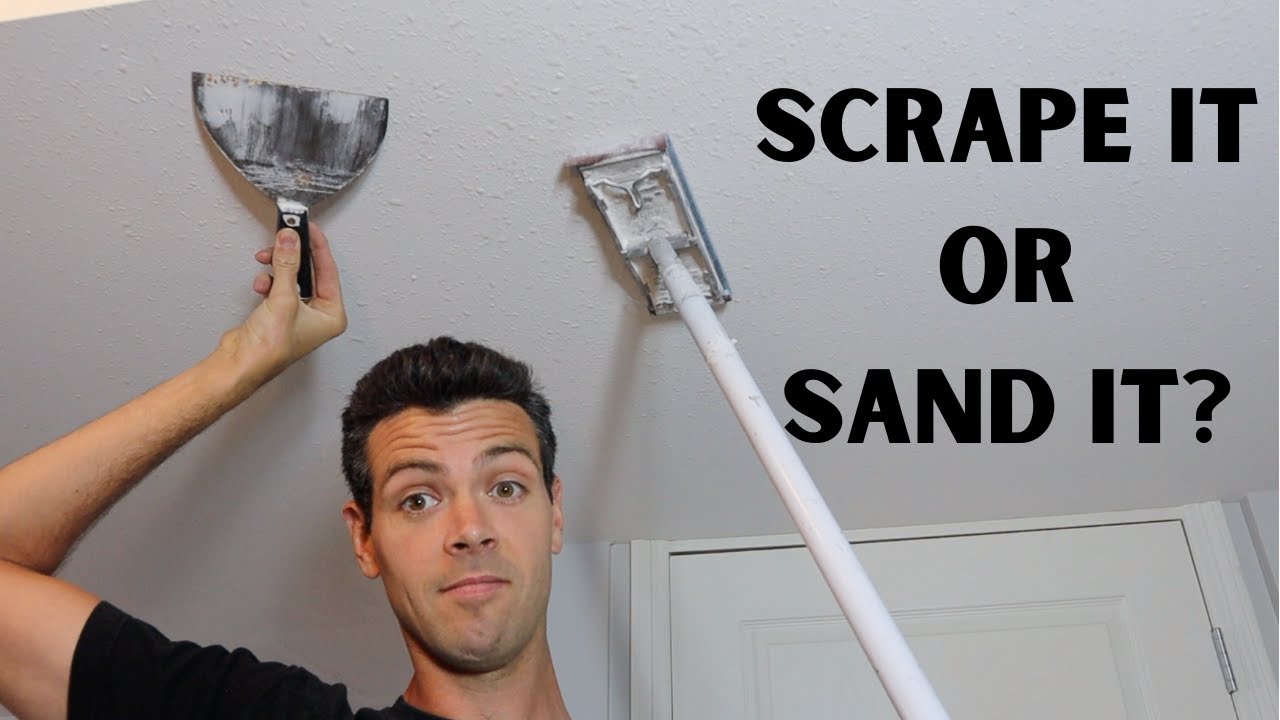
Sanding spackle is an excellent way to prepare drywall in preparation for painting. Sanding spackle can be quite messy. Sanding spackle creates a lot of dust. While sanding spackle, you should always use a mask.
You will need a sanding pad and sandpaper to sand spackle. It is best to use a fine grit sandpaper for spackling. You should use a fine grit sandpaper to feather out the edges and sand down any rough spots. You may get scratches on your spackling patches if you use coarse sandpaper.
Be sure to remove all old, damaged material before you begin sanding spackle. Sanding can help you achieve a smoother finish. It is important that you wait for the surface to dry before you start painting. Allowing spackle to dry for a few hours before you can start painting will help reduce the likelihood of it hardening.

To achieve a smooth surface, you can use a putty knives during sanding. To avoid uneven pressure points, make sure the edge of the putty knives is perpendicular with the wall. Also, ensure that you are using a good quality paintbrush.
You can also use a damp sponge for spackling. It is important to wash the sponge after every use. This will stop spackle flying about and leaving debris on your floor. A wet sponge can also be used to clean up your work area.
Spackle can be either white or light grey. The color of your spackle can change depending on what type you use. Some spackles may be ready-made. Other spackles must be mixed in water. There are also some spackles that are powdery. You can use either the powdery or the sanded version of spackle to make a small patch. Make sure to read the instructions.
Usually, it takes between two and four hours for spacklings to dry. The drying time can vary depending on the temperature and humidity inside your house. A hair dryer is a great way to speed up drying. Using a dehumidifier can also help.

It is essential to have a well-ventilated work area. This is especially important if you're using a sponge to sand. It is a smart idea to use a mask if you are working near high humidity. Sealing the room will help stop dust from traveling.
You may need more than one coat, depending on the size of the hole. The first coat should be completely dry before you add the second or third. For a uniform finish, you can spread the spackle between coats.
You can also try wet-sanding if you're fixing holes in drywall. This method can be very handy and reduces the mess. Wet sanding uses a sponge along with a sanding brick.
FAQ
Do you prefer to hire a general contractor, or a subcontractor for your project?
A general contractor will usually cost more than a subcontractor. General contractors often have many employees and charge clients high labor costs. A subcontractor on the other side only employs one person, so he/she charges less per-hour.
How do I start a renovation of a house?
Fixing up a home starts with cleaning out all the clutter from inside and outside. Next, clean out any moldy areas. Next, clean the exterior surfaces and paint.
How do you choose a good contractor to work with?
Ask your family and friends for recommendations when choosing a contractor. Look online reviews as well. It is important to confirm that the contractor that you choose has worked in the same area as you. Ask for references and check them out.
Can I renovate my whole house myself?
If you are able to do it yourself, why not pay someone else?
No matter how much DIY you love, there will be times when it is impossible to do it yourself. It may be impossible to control the many variables.
For example, if you live in an old home, you might find that the wiring is outdated and you would need to hire a qualified electrician to make sure that your electrical system is safe and reliable.
Consider that you may not be able repair any structural damage that might have occurred during the renovation.
Additionally, you may not have the right tools to complete the job. For instance, if you are planning to install a new kitchen sink, you'll need to buy a special tool called a plumber's snake which is used to clear clogged pipes.
You must also follow plumbing codes to ensure that a licensed plumber is working on your project.
Let's just say that you must know what you can do before you undertake such a daunting task.
If you aren't sure if you have the skills or knowledge to tackle the task, get help from your family and friends.
They can give you advice on what steps you need to take and where you can go to learn more about the subject.
Are you able to live in a renovated house?
Yes, you can live in your house while you renovate it.
Are you able to live in your house while the renovations are ongoing? The time taken to complete the work will impact the answer. If the renovation lasts less then two months, then it is possible to live in your home while it is being constructed. If the renovation takes longer than two weeks, however, you can't live in your home during the construction.
There are many reasons why you should not live at home during major construction projects. You might be hurt or even die from falling objects on the site. There is also the possibility of dust and noise pollution from the heavy machinery at the job site.
This is particularly true if you live on a multi-story home. If this happens, the sound and vibration caused by the construction workers can cause significant damage to your home and contents.
As I mentioned before, while your home is being remodeled, you'll have to manage the inconveniences of living in temporary shelters. This means you won't be able to use all the amenities in your own home.
When your dryer and washing machine are in repair, for example, you won't have access to them. You will also have to put up with the smell of paint fumes and other chemicals as well as the loud banging sounds made by the workers.
These factors can cause stress and anxiety in you and your family. It is therefore important to plan ahead so that you don't end up feeling overwhelmed by the situation.
It is important to research before you start renovating your house. This will help you avoid costly mistakes down the road.
It is also advisable to seek professional assistance from a reputable contractor so that you can ensure that everything goes smoothly.
How do you make a house look new?
If you are looking to renovate a house with no money, here are some steps:
-
Create a budget plan
-
Find out the materials you require
-
You must decide where to place them
-
Make a list with the items you need to purchase
-
How much money do you have?
-
Plan your renovation project
-
Start working on your plan
-
Online research is a good idea.
-
Ask family members and friends for help
-
Be creative!
Statistics
- It is advisable, however, to have a contingency of 10–20 per cent to allow for the unexpected expenses that can arise when renovating older homes. (realhomes.com)
- They'll usually lend up to 90% of your home's "as-completed" value, but no more than $424,100 in most locales or $636,150 in high-cost areas. (kiplinger.com)
- Rather, allot 10% to 15% for a contingency fund to pay for unexpected construction issues. (kiplinger.com)
- Design-builders may ask for a down payment of up to 25% or 33% of the job cost, says the NARI. (kiplinger.com)
- According to the National Association of the Remodeling Industry's 2019 remodeling impact report , realtors estimate that homeowners can recover 59% of the cost of a complete kitchen renovation if they sell their home. (bhg.com)
External Links
How To
5 Things You MUST Know Before Starting Your Home Renovation
-
This is a big undertaking. If you're planning on embarking on major home improvement projects like renovating your kitchen, bathroom, or building a brand new house, it's certain that you'll need to have some assistance. However, if you feel unsure about your ability to complete such a big task by yourself, you might consider hiring someone to help you. You could lose a lot of time and money and not reap any real benefits. Instead, why not hire someone who knows what they're doing to help out? They'll save your time and make it easy for you to have a wonderful place to call home.
-
How much should I spend? This may seem obvious but it could make things worse if you spend too much on your renovation project. You'll likely have to repay most of your costs at the end. So if you've got a budget in mind, stick to it! Without it, you may end up paying a lot but not getting anything back.
-
Do I prefer to hire professionals or DIY? - There's no right and wrong answer. We recommend hiring professional tradespeople, however, if you're able to afford them. Their advice will be invaluable in helping you decide how to proceed. They will be able to install the plumbing properly, make sure everything is safe, and give you a warranty after they are done. DIY projects often involve a lot trial and error. You'll learn a lot the hard way. There will be many problems along the way.
-
What are my options? - Don’t underestimate the cost associated with a home renovation. Even if the project seems manageable, it could prove costly and you will need to borrow money. It is also important to consider the selling price of your current property when you plan on selling it soon after you have completed the renovations.
-
How do I begin? - When it comes to choosing where to start, there's no right or wrong place. However, we would suggest that you choose somewhere that you enjoy working on. If you enjoy what you do, you will be more motivated to continue working and less likely procrastinate. Also, avoid places that are difficult to maintain. You should avoid redecorating your living room if it is always covered in dirt and dust.